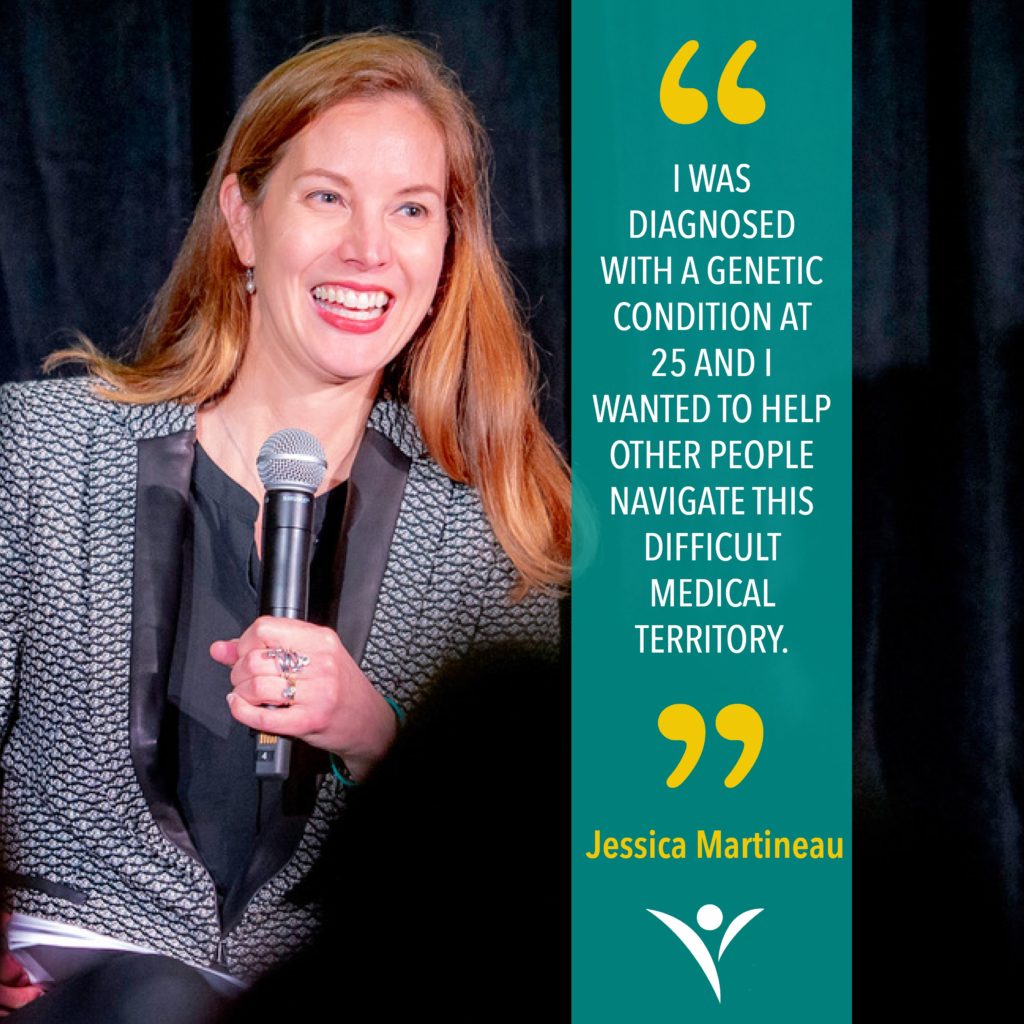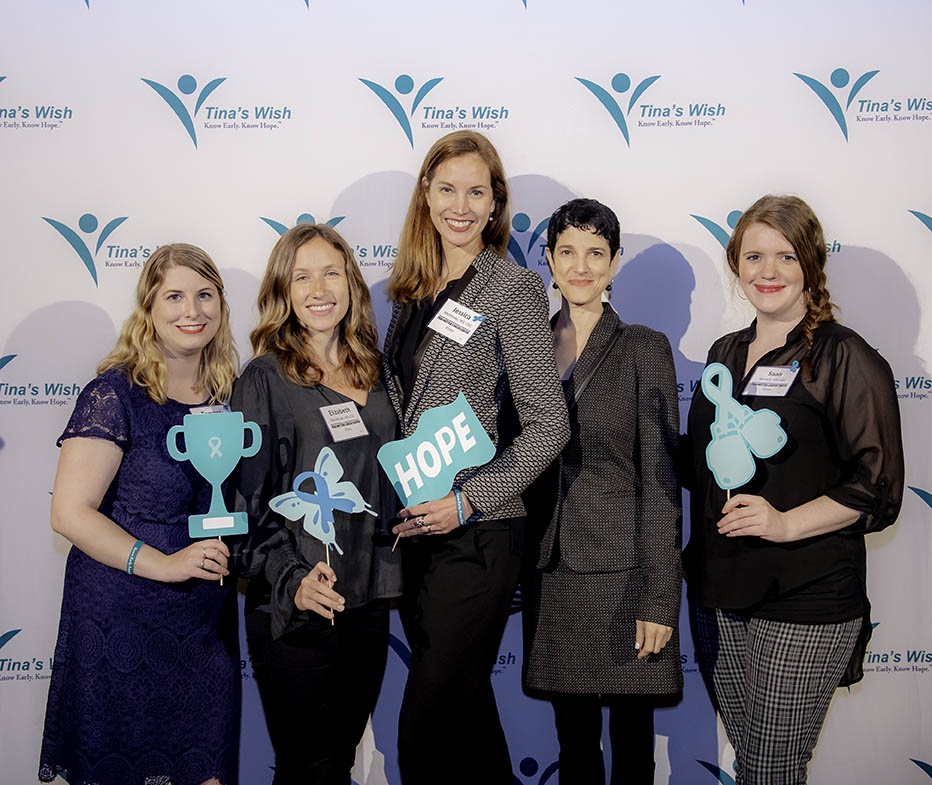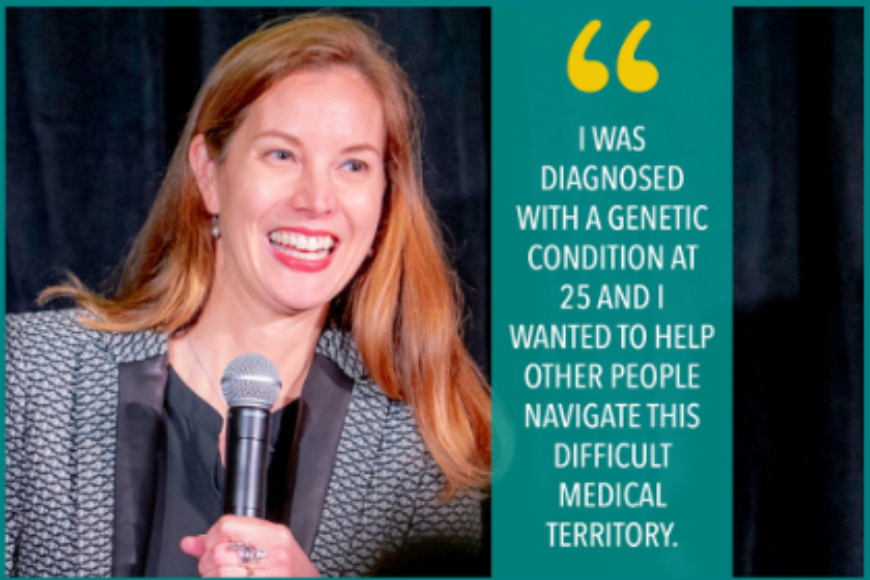Q&A with Genetic Counselor Jessica Martineau

Jessica Martineau is a board-certified genetic counselor who specializes in cancer genetics. She is a clinical supervisor for the Sarah Lawrence College Graduate Program in Human Genetics and a member of the High-Risk Cancer Genetics Program team at NYU Langone’s Perlmutter Cancer Center. Jessica’s professional and research interests include familial gynecologic cancers, cancer susceptibility in rare genetic syndromes and psychosocial counseling in cancer-prone families.
Q&A with Jessica
What are the genetic risk factors for ovarian cancer?
The common genetic risk factors for ovarian cancer are:
- If you yourself have a history of breast cancer, endometrial cancer or colon cancer diagnosed before the age of 50.
- If anyone in your family has had breast, endometrial, or colon cancer diagnosed before the age of 50 or a family history of ovarian cancer, advanced prostate cancer or pancreatic cancer.
- If there is a known BRCA mutation or Lynch syndrome mutation in your family.
- If you are of Ashkenazi Jewish decent and have a family history of breast or ovarian cancer.
What is a BRCA mutation? Can men carry the BRCA mutation?
The BRCA 1 and 2 genes are important genes – everyone (both men and women) have them. These genes protect us from cancer; they are tumor suppressors and help repair damaged DNA. If BRCA 1 or 2 genes are mutated, then they may not be able to repair damaged DNA properly and this can lead to cancer.
Women with a BRCA 1 mutation have a lifetime risk of about 44% to develop ovarian cancer by the age of 80.
Women with a BRCA 2 mutation have a lifetime risk of about 18% to develop ovarian cancer by the age of 80.
Men can absolutely carry the BRCA mutation. Knowing our father’s family history is just as important as knowing our mother’s family history.
If one suspects that she might be in a high-risk group for ovarian cancer, who should she go see? How do you find out if you have a genetic mutation?
I recommend that anyone who suspects they are in a high-risk group for ovarian cancer to meet with a genetic counselor. Genetic counselors are health professionals with advanced training in genetics and counseling.
The first thing I do with all my patients is a review of their personal medical history along with a thorough evaluation of their family medical history. After doing so, I go over the risks, benefits and limitations of genetic testing with them.
Genetic testing involves providing a blood or saliva sample which is then sent to a genetics laboratory. When my patients decide to have the testing done, I help facilitate the process, interpret and explain the results and we discuss the individual’s cancer risks and management options.
What inspired you to become a genetic counselor?
I was diagnosed with a genetic heart condition at 25 after a cardiac arrest. I wanted to help other people understand their genetic risk for disease and help them navigate through this difficult medical territory.
As a genetic counselor, you are walking your patients through some very personal discoveries about their bodies and big life decisions relating to these discoveries. How do you approach these conversations?
I approach these conversations with great care. This is a critical moment in a patient’s life where she/he is potentially facing confirmation of a hereditary risk for cancer. My patients are trusting me with very private information and also trusting my knowledge and guidance through their genetic testing process. I take great care to make sure my patients understand the information, understand their options and the implications of this testing on their lives and their clinical management.
What are the biggest benefits to going to see a genetic counselor?
There are many benefits. Some of the significant ones include 1) learning of a likely cause for a personal diagnosis of cancer 2) learning that you may be at an increased risk for certain cancers and that there may be surgical and surveillance options for you to reduce that risk 3) learning that you DO NOT have an increased risk for cancer and that you can be screened for cancer according to population-based screening protocols 4) having certain treatment options become available to you based on your genetic testing result.
How can someone find a genetic counselor?
You should ask your doctor if they can give you a referral. You can also visit the National Society of Genetic Counselors directory: nsgc.org
What can people do to spread awareness about genetic mutations and the fact that there is testing and genetic counselors available? Do you feel that there is enough awareness around this?
Bringing awareness to genetic testing and counseling in your community is a great thing. Talking with your friends, family, support groups, and community groups is an excellent place to start. Social media has always been a very effective way spread the word as well. Genetic testing is not necessary for everyone but it should certainly be considered if anyone has a personal or family history of ovarian cancer, a personal or family history of early onset breast, colon or endometrial cancer, a family history of multiple relatives affected with cancer on the same side of the family or Ashkenazi Jewish ancestry.
I feel that awareness about genetic testing and counseling is growing but we still have a long way to go. Recent studies show that about 50% of patients with an ovarian cancer diagnosis are referred for genetic counseling and about 30% are completing genetic testing. We still have some work to do as a community to bring awareness to this very important piece of the ovarian cancer puzzle.



I discovered a few weeks before my METASTATIC SEROUS. AGGRESSIVE, PERITONEAL Cancer diagnosis that I had an ATM mutation. This was January 2018! My mom had breast ca., my Dad had pancreatic cancer. Had complete hysterectomy in December, 2015! This GYN CA is treated as Ovarian Ca. I went into treatment with Chemotherapy immediately, had debulking surgery after 3 treatments of taxol/carboplatin. Then 3 more treatments but while cancer was much smaller, CA125 in the 40’s, no NED OR STABILITY. Had 2 more rounds of taxol/carboplatin/Avastin.. Was put on Gemzar/Carboplatin, Avastin for 6 rounds, scans continued every 3 months. Ca125 stabled in the low 40’s,High 30’s. After 6 rounds stayed on only AVASTIN until CA 125 started trending up.
Put on clinical trial in June. CT Scan still stable but CA 125 continues to rise. I have currently had two infusions of OPDIVO/YERVOY, two more to go then just OPDIVO! If it is working, delay of 2nd infusion by a week because too ill. Delayed 3rd infusion because too ill. Maybe get 3rd infusion this Tuesday. My main Dr. is a GYN SURGICAL ONCOLOGIST, My other Dr. is a Medical Research MD, PhD ONCOLOGIST. I did get genetic counseling but can’t really do anything about my breast/pancreatic cancer risk, right now? Do you have suggestions. I am just trying to get more time with my family. I know there is no cure. I said yes to clinical trial because I was told BEST OPTION with tumor burden small. Ca125 rising but everything is being monitored. I totally understand if you have no suggestions
I was dx with Stage 2b ovarian cancer in May 2019 and will be receiving my 5/6 round of chemo next week. I recently discovered that I am positive for the Braca gene 1. The plan now is 6 months after my treatment for the ovarian we will do a MRI of the breast and if it shows anything do a mastectomy if my body is strong enough. I’m 65 years old, and definitely plan to keep on fighting. Are there any survival statistics for 2b ovarian. Thank you
Margy, our sincere apologies. We just now saw this comment because of an error with our blog comment notification system. Please let us know if you would like us to follow-up with Jessica or if your question has already been answered. Sending strength, comfort and positive thoughts your way. Also, feel free to reach out to me directly (cwilson@tinaswish.org) – Caroline Wilson, Tina’s Wish
Kim, our sincere apologies. We just now saw this comment because of an error with our blog comment notification system. Please let us know if you would like us to follow-up with Jessica or if your question has already been answered. Sorry to hear about your diagnosis. Sending our best wishes your way. Also, feel free to reach out to me directly (cwilson@tinaswish.org) – Caroline Wilson, Tina’s Wish